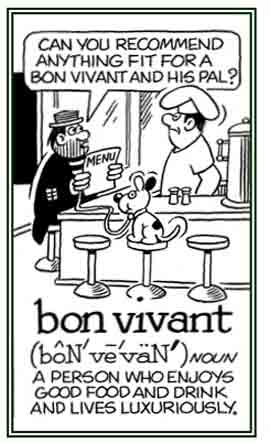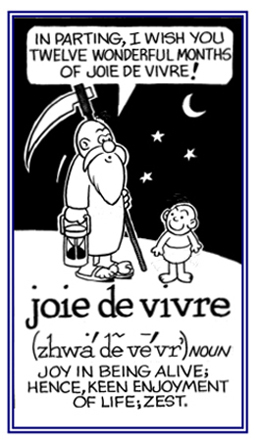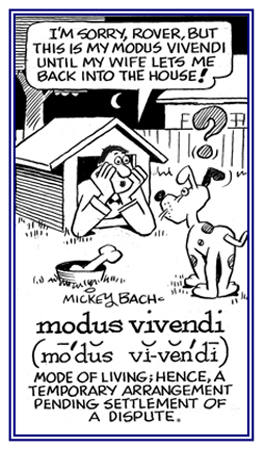viva-, vivi-, vivo-, viv-
(Latin: life, alive)

Go to this Word A Day Revisited Index
so you can see more of Mickey Bach's cartoons.
2. A reference to being fond of feasting, drinking, and being sociable.
3. Etymology: from Late Latin convivialis; from Latin convivium, "a feast"; from convivere, "to carouse together"; from com-, "together" + vivere, "to live".
Convivial means "jovial, sociable", and "cheerful"; as in charismatic, except that convivial doesn't necessarily mean personal magnetism; but rather, an ability to enjoy oneself.
2. Anyone who is fond of feasting, drinking, and being with merry company; jovial.
2. The good humor and festivity indulged in during occasions of celebration.
3. Etymology: derived from Latin convivium, "banquet"; from com- + vivere, "to live".
2. Etymology: from Latin co- (a form of com-), "with, together" + vivere "to live."
The term covivant, was created by Richard Lederer, a former English teacher, author and columnist and is in Lederer's words.
Fashioned from the Latin co-, "together" and the French vivant, "living."Covivant is bilingually enduring and endearing. Its Latin form communicates a sense of permanence and stability, and its Frenchness lend the perfume of romance.
Compiled from Ainekatt.deviantart.com/journal.
If you want to see what others are writing about covivant, go to www.google.com for more searches.
Opposite of in vitro.

Go to this Word A Day Revisited Index
so you can see more of Mickey Bach's cartoons.
A motto of St. Joseph's Seminary, Yonkers, New York, USA.
2. The temporary arrangement between two or more parties, or countries, to enable them to get along together, pending a full settlement of a dispute: The nations worked out a modus vivendi in order to avoid war.
There are some authorities who maintain that modus vivendi should describe only a truce between disputing parties until there is a settlement of their disagreements.
3. Etymology: a Latin phrase which means "manner of living" in English.

